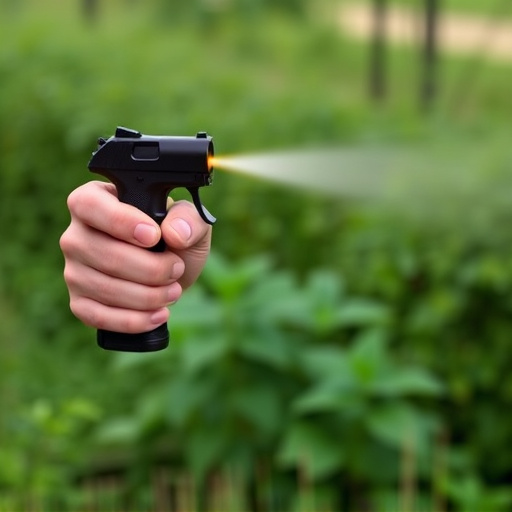In today's world, focusing on non-lethal self-defense options like pepper spray, stun guns, and alarms is growing in popularity for personal safety. These alternatives empower individuals to deter threats without using firearms, adhering to principles of proportionate force and personal responsibility. However, navigating legal and ethical factors—including varying legality and the potential impact on attackers—is crucial when exploring these tools, which offer swift solutions for everyday scenarios, enhancing peace of mind and reducing reliance on law enforcement.
“As personal safety becomes a growing concern, exploring non-lethal self-defense options offers a comprehensive solution. This guide delves into the diverse range of devices designed to deter attacks without causing harm. From pepper spray and tasers to noise makers and stun guns, we examine their effectiveness in everyday life. Additionally, we explore legal and ethical considerations surrounding alternative weapons to guns, ensuring informed decisions. Stay ahead, stay safe.”
Exploring Non-Lethal Self-Defense Options: A Comprehensive Guide
In today’s world, exploring non-lethal self-defense options has become increasingly important for personal safety and security. While traditional firearms are often considered the primary means of protection, there is a growing trend towards alternative weapons to guns that offer safer yet effective methods for deterring potential threats. These non-lethal devices cater to individuals who prefer not to carry or use deadly force as a first resort.
A comprehensive guide to non-lethal self-defense options reveals an array of innovative tools, such as pepper spray, stun guns, and personal alarms. Pepper spray, for instance, is a popular choice due to its ability to temporarily disable an assailant by causing severe irritation to the eyes and respiratory system. Stun guns, on the other hand, use an electric current to disrupt muscle control, rendering the attacker helpless without causing permanent harm. Personal alarms are compact devices that emit loud sounds, drawing attention and potentially scaring off would-be attackers. Exploring these alternatives to guns empowers individuals to take charge of their safety while adhering to principles of proportionate force and personal responsibility.
The Role of Personal Safety Devices in Everyday Life
In today’s world, personal safety has become a top priority for many individuals, leading to an increased interest in self-defense devices as alternative weapons to guns. These tools are designed not just for combat but to empower people to protect themselves in various everyday scenarios, from walking home late at night to securing their homes against intruders. From pepper sprays and tasers to stun bats and personal alarm systems, these devices offer a range of options suitable for different situations and comfort levels.
Many personal safety devices are compact, easy to carry, and designed to be user-friendly, ensuring individuals can react swiftly when facing dangerous situations. For instance, pepper spray is a popular choice as it can temporarily disable an attacker, providing enough time for escape. Similarly, stun guns or tasers can deliver powerful jolts of electricity, immobilizing the target without causing permanent harm. These alternatives to conventional firearms provide peace of mind and a sense of security, encouraging individuals to take proactive steps towards personal safety without relying solely on law enforcement.
Legal and Ethical Considerations for Alternative Self-Defense Weapons
When considering alternative self-defense devices, it’s crucial to navigate a complex landscape of legal and ethical considerations, especially when opting for non-firearm options. Many traditional weapons like batons, pepper spray, and stun guns have varying levels of legality and acceptability depending on jurisdiction. For instance, some regions have strict regulations on the type and carrying of these devices, with certain areas prohibiting them altogether.
Ethically, the choice of alternative self-defense should also weigh personal responsibility and safety. Pepper spray, for example, can cause temporary but severe disorientation, making it a powerful tool when used judiciously. Similarly, stun guns deliver an electric shock, temporarily incapacitating a threat. However, users must be trained to ensure they employ these devices only as a last resort, avoiding unnecessary harm or abuse of power.
